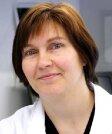Associate Investigators
In addition to the principal Investigators, a number of associate investigators also advance the goals of the Centre, their contribution to the Centre and scientific collaborations complement and strengthen the Centre’s activities.
Many of these investigators directly support the research themes of the Centre while others have related research projects that benefit from Gravida financial support.
-
Dr Jane Alsweiler

Department of Paediatrics: Child and Youth Health, , Auckland
MBChB, FRACP, PhD
Jane is a neonatal paediatrician whose research interests focus on neonatal glucose homeostasis and growth, including long-term consequences of hypo- and hyperglycaemia, and consequences of perinatal care, including probiotics and antenatal treatments. She has an appointment as a senior lecturer at the Department of Paediatrics, University of Auckland and an honorary appointment at the Liggins Institute, University of Auckland.
Jane works clinically at the neonatal intensive care unit (NICU) at National Women’s Health. She is the leader of the clinical trials team of the LiFePATH research group at the Liggins Institute.
-
Associate Professor Greg Anderson

Otago Centre for Neuroendocrinology, University of Otago, Dunedin
Greg is neuroendocrinologist whose focuses on the regulation of fertility by nutritional factors (leptin, insulin and ghrelin) and the mechanisms by which the recently-discovered brain peptide RFamide-related paptide-3 (RFRP-3, the mammalian homologue of avian gonadotrophin inhibitory hormone) regulates GnRH activity and anxiety in mammals.
His research group forms one of the laboratories that make up University of Otago's Centre for Neuroendocrinology. He is currently funded by the Health Research Council of NZ and the Royal Society of NZ Marsden Fund.
A more extensive biography can be found on the University of Otago Centre for Neuroendocrinology website.
-
Dr Polly Atatoa-Carr

School of Population Health, , Auckland
MSc, MBChB, MPH, FAFPHM, FNZCPHM
Polly is a Public Health Medicine Specialist whose research interests include life course epidemiology; the societal and cultural influences on equitable health and educational outcomes; research ethics; and the translation of evidence into effective and responsible policy. Prior to her medical and public health training, Polly’s academic career began with a BSc from the University of Waikato and a MSc in molecular biology from . Polly is currently Associate Director of both 'Growing Up in ' and the Centre for Longitudinal Research – He Ara ki Mua at and an Honorary Senior Lecturer based at the Waikato Clinical School in Hamilton.
-
Dr Matthew Barnett
Food Nutrition & Health Team, AgResearch, Auckland
BSc, MSc(Hons), PhD
Matthew graduated from in May 2005 with a PhD in Biological Sciences, focusing on the important of a mother’s diet during gestation and lactation on the risk of type 2 diabetes in her offspring. Since 2001 he has worked for AgResearch Limited as a Research Associate, FRST Postdoctoral Fellow, and Research Scientist. His time at AgResearch has included work on nutrigenomics and nutritional epigenetics (as part of Nutrigenomics ), the effect of nutrition on milk protein synthesis, and intestinal iron transport.
While still working for AgResearch, Matthew is currently located at ’s Liggins Institute. He is involved in several projects investigating the importance of nutrition for health throughout life. Matthew has recently combined science with a love of music to create songs describing, among other things, epigenetics and the benefits of dietary fibre.
-
Dr Caroline Beck

Department of Zoology, University of Otago, Dunedin
PhD
Caroline is a developmental biologist and senior lecturer at the University of Otago. She is interested in how a single cell, the fertilised egg, develops into a complex multicellular organism that progressively acquires the form and functions of its parents. Comparative studies over the last 20 years have shown that a handful of genetic pathways are deployed not only during early development, but also in the formation and regeneration of different organs. Caroline’s research has focused on how regulation of these key pathways link development, repair and disease.
Caroline’s group is currently using the amphibian model organisms Xenopus laevis (African Clawed frog) and Ambystoma mexicanum (Axolotl) to study the molecular basis of how limbs are patterned and why their regeneration is limited in most species. They are also investigating effect of drugs that alter epigenetic modifications to chromatin and have shown that exposure can alter the natural history of limb and spinal cord regeneration in amphibians. This is important because drugs that interfere with epigenetic modifications, such as valproic acid and 5-azacytidine, are common therapeutic agents and the long-term effects of exposure in utero to healing and regeneration outcomes in mammals are not known.
A list of Caroline's publications can be found on her University of Otago webpage
-
Dr Alys Clark

Auckland Bioengineering Institute, , Auckland
BA(Hon), MA, PhD
Alys is a bioengineer whose research focuses on focus on relating structure to function across spatial scales in developing lungs, placenta and ovaries via computational modelling and image analysis. Her research includes quantitative analyses of high resolution imaging data and the construction of anatomically based geometries representing these images. Within these geometries Alys uses physical laws (e.g. conservation of mass, conservation of momentum) to predict key functional measures such as tissue perfusion and oxygenation. This research provides a link between observed imaging features and function from small-scale mechanisms to whole organ behaviour in health and disease and can be used to test hypotheses on the mechanisms that result in diseased states.
A more extensive biography of Alys' work can be found on the .
-
Dr Stefan Clerens

Proteins & Biomaterials team, AgResearch, Lincoln, Christchurch
BSc, MSc, PhD
Stefan is the team leader of AgResearch’s Proteins & Biomaterials Team. He did his undergraduate and PhD at the University of Leuven (Belgium). He is an expert in proteomics and biomolecular mass spectrometry, including the application of qualitative and quantitative proteomics and imaging mass spectrometry to a variety of biological questions.
The Proteins & Biomaterials Team are focused on understanding molecular determinants of quality and functionality in protein products. The study of food, food products and nutrition ingredients forms an important part of this. Examples include research into functional meat-based ‘combifoods’ for specific age groups (infants and the elderly), and the study of processing-induced protein damage in infant formulas.
-
Dr Christine Couldrey
AgResearch, Hamilton
-
Dr Elizabeth Duncan

Laboratory for Evolution and Development, Department of Biochemistry, University of Otago, Dunedin
BSc, BSc(Hons), PhD
Liz did her undergraduate degree at Victoria University of Wellington majoring in Biochemistry and Genetics and her PhD at the University of Otago in conjunction with AgResearch. Elizabeth’s PhD work investigated the genetic basis of resistance to facial eczema disease in sheep.
Liz's research interests include phenotypic/developmental plasticity, gene/environment interactions, epigenetics, genomics and genome architecture, insect development, and the evolution of development and early developmental pathways.
Liz joined the Laboratory for Evolution and Development in 2007 and has worked on several projects with Associate Professor Peter Dearden. During this time she has developed diverse research interests surrounding evolution and development, particularly the evolution of early developmental pathways in invertebrates and the evolution and mechanisms of phenotypic plasticity. In 2010 Elizabeth was awarded a University of Otago postdoctoral fellowship to work on an Gravida-funded project examining the molecular mechanisms of phenotypic plasticity in the honeybee.
-
Dr Mhoyra Fraser

Liggins Institute, , Auckland
BSc, Dip Sci, MPhil, PhD
Mhoyra is a neuroendocrinologist interested in fetal brain development and the HPA axis. She has contributed substantially to the understanding of fetal brain development and how this is disrupted when fetuses are deprived of oxygen or exposed to glucocorticoids.
Mhoyra did her PhD in Auckland with Mont Liggins on fetal endocrine systems after completing her MPhil with Peter Gluckman. Following this she spent 10 years doing research in Canada. Her main research interests are in investigating the adverse effects of preterm fetal exposure to stress on fetal development and long term health.
A further profile of Mhoyra's research can be found on the Liggins Institute website.
-
Associate Professor Cameron Grant

School of Population Health, Tamaki Campus, , Auckland
MBChB, PhD
Cameron is an Associate Professor in the Department of Paediatrics: Child and Youth Health at and a paediatrician at Starship Children’s Health. He is the Associate Director of Growing Up in and of the Centre for Longitudinal Research – He Aka ki Mua, at . He graduated MBChB from the University of Otago and PhD from .
His research focuses on health problems that are common, affect children disproportionately, and are preventable by immunisation or improved nutrition.
A further biography can be found on the University of Auckland website.
-
Dr Katie Groom

, Auckland
PhD
Katie is a Senior Lecturer in the Department of Obstetrics and Gynaecology, University of Auckland and a subspecialist in Maternal and Fetal Medicine at National Women’s Health, Auckland City Hospital. She graduated in medicine from Imperial College London and commenced specialist training in obstetrics and gynaecology in the UK. Katie completed her PhD at Queen Charlotte’s Hospital, Imperial College London.
After relocating to Auckland, Katie completed her specialist training in obstetrics and gynaecology and subspecialist training in maternal and fetal medicine. Her research now focuses on clinical trials of therapies and interventions for the prevention and treatment of the major complications of pregnancy – preterm birth, preeclampsia and fetal growth restriction. She collaborates closely with other researchers in her field across and Australia.
Katie is the Secretary of the Perinatal Society of (PSNZ) and an active member of the Maternal Fetal Medicine Network (NZMFMN) responsible for the development of several national clinical guidelines and education of health care professionals involved in women’s health across the country.
-
Dr Jian Guan

Liggins Institute, , Auckland
PhD
Dr Jian Guan is neuroscientist and her research interests include nutritional and environmental effects on brain development and function by evaluating neuroplasticity, vascular remodelling and the interactions of neurons, glial phenotypes and capillaries. Her research specialty includes neurobiology and neuro-pharmacology of IGF-1 and its related peptides, animal modelling of neurological conditions, behavioural evaluations, biological and pathological assessments of brains.
-
Professor Harlene Hayne

University of Otago, Dunedin
Harlene's specialist research interests include memory development, interviews with children in clinical and legal contexts, and adolescent risk-taking. Professor Hayne is a Fellow of the Royal Society of and of the American Psychological Society. She is the Associate Editor of Memory and of the Journal of Psychology. She also serves on the editorial boards of 6 additional international journals. In 2009 Harlene was awarded the Order of Merit for services to scientific and medical research and in 2012 she was awarded an Honorary Doctor of Science from Colorado College. She is a member of the Board of Fulbright, and has recently been appointed to the Board of Treasury.
Harlene is the Co-chair of the Office of the Prime Minister’s Science Advisory Committee Working Party on Reducing Social and Psychological Morbidity during Adolescence and the Co-Director of the Innocence Project. She has published extensively and continues to supervise PhD, Masters and Honours students.
Harlene is also the Vice-Chancellor at the University of Otago.
-
Dr Mary Hedges

Centre for Longitudinal Research, , Auckland
BApplEcon, MCom(Hons), PhD, PGCAP
Mary’s focus is applied micro-economics. She answers real-world questions about individual choice in the areas of education and health, using tailored analytical tools and economic reasoning.
Mary joined in 2004 and the Centre for Longitudinal Research in 2010. Her current work is using economic modelling to analyse the lifecourse cost-benefit on ‘Growing Up in ’ and the Gravida-funded ‘International Healthy Start to Life’ project.
Current projects:
-
Dr Annette Henderson

School of Psychology, , Auckland
BA(Hon), Msc, PhD
Annette is a developmental scientist with research interests in language and socio-cognitive development in early childhood (0-4 years). Specific research topics include the development of cooperation, fairness, prosocial behaviour, and word learning in infants, toddlers, and preschoolers. The main questions that underscore her research programme are: 1) what do infants and young children understand about their social world? and 2) how does this understanding influence their learning? To investigate these questions Annette established the Early Learning Laboratory (ELLA) in the School of Psychology at and uses a variety of methodological tools (e.g. eye-tracking, visual attention, behavioural observations, and parent-child interactions).
A more extensive biography can be found on the University of Auckland website.
-
Dr Julia Horsfield

Department of Pathology, University of Otago, Dunedin
BSc(Hons), PhD, DipAppSci
Julia is a developmental geneticist based in the Department of Pathology at the University of Otago.
Julia’s research seeks to understand how components of chromosomes influence cell type specification during development, with a particular interest in the function of proteins that structure chromatin in the nucleus, including Cohesin and CTCF. The overall goal of her research is to understand chromatin mechanisms contributing to gene expression in development, epigenetic inheritance, and cancer, using cancer cell lines and the exemplary animal model, the zebrafish.
A further outline of Julia's research can be found on her University of Otago webpage.
-
Dr Noelyn Hung
University of Otago, Dunedin
-
Dr Joanna James

Department of Obstetrics and Gynecology, Faculty of Medical and Health Sciences, , Auckland
Jo is a Lecturer in the Department of Obstetrics and Gynaecology at . Her research is focussed on the two types of stem cells in the placenta – mesenchymal stem cells and trophoblast stem cells. In particular she is interested in how these cells can help us understand how the placenta is formed successfully in early pregnancy, and how they may be targeted therapeutically to improve pregnancy outcomes.
Jo undertook her PhD on cell differentiation within the placenta under the supervision of Associate Professor Larry Chamley at . She was then awarded a NZFRST fellowship that allowed her to move to the UK where she spent 3 years at St George’s University of London examining how uterine haemodynamics may affect spiral artery remodelling during early pregnancy. She returned to NZ in 2011 through the award of the Inaugural AMRF Goodfellow Repatriation Fellowship where she returned to the placental side of the materno-fetal interface and began her work on placental stem cell populations, although she maintains her interest in uterine haemodynamics through collaborative work with Dr Alys Clark of the Auckland Bioengineering Institute.
More information and relevant publications can be found at: http://www.fmhs.auckland.ac.nz/staff/j.james
-
Dr Anne Jaquiery

Ngapouri Research Farm Laboratory, Liggins Institute, , Auckland
PhD
Anne is a consultant paediatrician at Rotorua Hospital. She completed her PhD at the Liggins Institute investigating the effects of undernutrition around the time of conception on the mother's pregnancy and the health of her offspring. She has ongoing research interests in neonatal and paediatric nutrition including the long-term consequences of altered nutrition and irregular eating patterns in early life, the treatment of intrauterine growth restriction and preterm birth and its consequences.
Anne has joint research and clinical appointments with the Liggins Institute, Department of Paediatrics (University of Auckland) and Lakes DHB.
Current projects:
-
Dr Christine Jasoni
Dept of Anatomy and Structural Biology, University of Otago, Dunedin
Christine is a developmental neuroscientist, which means she spends most of her time thinking about how the brain forms and matures throughout life, including the fetal period.
She has undergraduate degrees in Biology and Mathematics from the University of California, a PhD in developmental neuroscience from the University of Washington, and has worked for 5 years in the biotech industry in both the US and NZ, and is now happily ensconced in academia at the University of Otago.
Christine's current research explores how a mother's health during her pregnancy impacts the formation of the fetal brain, and how that can elevate the risk of later life behavioural abnormalities, including disordered eating, autism and schizophrenia. She uses mouse models of maternal obesity, gestational diabetes, and immune activation, coupled with high-throughput sequencing and transgenic approaches to gain unique molecular insight. Her work specifically examines whether the generation of new nerve cells or their ability to make 'connections' with other cells in the brain may be altered by maternal ill-health.
Christine collaborates with several researchers within Gravida, including Phil Baker, Dave Grattan, Peter Dearden and Mark Vickers, as well as David Bilkey from the Department of Psychology at Otago, Phil Sheard from the Department of Psychology at Otago, Andrew Clarkson from the Department of Anatomy at Otago, and Michael Piper in the School of Biological Sciences at the University of Queensland, Australia.
Christine is an enthusiast and populariser of all things science - especially Neuroscience! To this end she writes a popular science column for the Southland Times, and gives public lectures throughout Otago and Southland. She is a member of council for the Royal Society of , the president of the Otago Institute for the Arts and Sciences, and Director of the Otago Neuroscience degree programme.
further information on Christine can be found on her .
-
Dr David Long

Auckland Bioengineering Institute, , Auckland
BSc, MSc, PhD
David’s research centres around developing multi-scale models of endothelial cell mechanobiology; these models are used to better understand the spatial and temporal dynamics of the vascular endothelium. Major areas of David’s research programme are the following: endothelial cell mechanobiology and heterogeneity, and its relation to health and disease; developmental determinants of disease; and, glycans and cell signaling.
David graduated with a Bachelor of Science degree in mechanical engineering from Tennessee Technological University, and Master of Science and PhD degrees (mechanical engineering) from the University of Illinois at Urbana-Champaign. After completing his PhD, he was a post-doctoral fellow in the Department of Biomedical Engineering at Duke University where he was awarded a Ruth L. Kirschstein National Research Service Award from the US National Institutes of Health. Currently, David is a Principal Investigator at the Auckland Bioengineering Institute and a Lecturer in the Department of Engineering Science at .
A more extensive biography can be found on the Auckland Bioengineering Institute.
-
Dr Erin C. Macaulay

Department of Pathology, University of Otago, Dunedin
PhD
Erin completed her PhD in 2011 at the University of Otago in Dunedin. Her research, supervised by Professor Ian Morison, investigated the human placenta for placenta-specific epigenetic modifications. Erin is continuing her exploration of the placenta’s epigenetic landscape, with a particular focus on the epigenetics associated with abnormal placental development and function.
Erin is currently studying the epigenetic contribution to pre-eclampsia, a potentially dangerous condition of pregnancy that is associated with abnormal placental development. She is also investigating the role of retrotransposons in the normal and abnormal placenta, since her previous work uncovered a handful of epigenetically ‘active’ retrotransposons in the placenta that are normally ‘silent’ in all other human tissues.
-
Dr Mark McCann

Food Nutrition & Health Team, AgResearch Grasslands Research Centre, Palmerston North
BSc, BSc(Hons), MSc, MRes, PhD, MSB, MRSNZ
Originally from Dublin in Ireland, Mark graduated from the University of Ulster at Coleraine in 2006 with a PhD in Biomedical Science, focusing on the effects of a dietary bio-active on prostate cancer. After his post-doc with the Northern Ireland Centre for Diet and Health, he moved to NZ in 2007 as a Research Scientist in the Biomolecular Discovery objective of Nutrigenomics . During his time with AgResearch he has been awarded a Marsden Fast-Start grant (2008-2011) and three successive Palmerston North Medical Research Foundation Wilson Grants (2010-2013) to examine the molecular mechanisms involved in a dietary compound’s anti-proliferative effects in prostate cancer. Mark's research interests include understanding the role of dietary bio-actives in disease (especially cancer) and more recently to include the role of miRNAs from food to influence human health and development.
Mark is based at AgResearch’s Grasslands Research Centre in Palmerston North. He is involved in several projects investigating the importance of nutrition for health throughout life and freely admits he has more degrees than anyone should have.
-
Dr Sue McCoard

Animal Nutrition Team, AgResearch Grasslands, Palmerston North
BSc, PhD (Animal Science)
Sue completed her PhD on the regulation of fetal growth and development in the sheep, with particular emphasis on the placenta and skeletal muscle at Massey University in 1998. She then spent 2.5 years as a Research Scientist at the USDA-ARS Roman L Hruska Meat Animal Research Centre in Clay Centre Nebraska working on the regulation of testicular and ovarian development during embryonic, fetal and neonatal stages in the pig. Sue was appointed to AgResearch in 2002.
Sue’s research focuses on understanding the role of nutritional programming of key tissues and organ systems during early life (pre- and neonatal) on economically important traits for productivity in sheep and cattle including survival, growth, and the production of meat and milk. Current research includes the development of early-life nutrition strategies (macro- and micro-nutrients) to influence the development and function of key tissues and organ systems (e.g. placenta, skeletal muscle, mammary gland, gastrointestinal tract). Outcomes of this research include the development of new technologies/strategies to enhance the productivity and efficiency of ruminant livestock production. Sue is the Acting Team Leader of the Animal Nutrition team at AgResearch Grasslands.
-
Professor Patrick Morel
Institute of Food, Nutrition & Human Health, Massey University, Palmerston North
-
Professor Steve Morris

Institute of Veterinary, Animal and Biomedical Sciences, Massey University, Palmerston North
BAgSci, MAgSci, PhD
Steve has expertise in animal production, sheep and beef cattle production, international agriculture, management of livestock farming systems, year-round lamb production systems, improved sustainable beef and sheep production from pasture
-
Dr Shinichi Nakagawa

Behavioural Ecology Research Laboratory, University of Otago, Dunedin
BSc(Hons), PhD
Shinichi is a behavioural ecology as well as an evolutionary biologist. Also, he is known for his work on applied statistics, especially meta-analysis and meta-analytic techniques. He established the Behavioural Ecology Research Laboratory at the Department of Zoology, University of Otago in 2008. He is currently on the editorial board of six international journals including being an Editor of Behavioural Ecology.
He leads a series of meta-analyses on the effect of maternal nutrition on offspring phenotypes in laboratory/agricultural model animals within a Gravida funded programme.
A more extensive biography is available on the .
-
Dr Justin O’Sullivan

Liggins Institute, , Auckland
BSc (Hons), PhD
Justin is senior research fellow at the Liggins Institute, . His research interests centre on the analysis of the spatial organisation of genomes and building our understanding of biological systems through the development of predictive, empirically defined three-dimensional models of genome organisation.
Justin completed his undergraduate degree at the University of Canterbury and PhD at the University of Otago, where he investigated the adherence of Candida albicans in the oral cavity. He then did a post-doc on the alternate nuclear genetic code in Candida albicans at the University of Kent at Canterbury (U.K.), and a second post-doc on transcriptional control in Saccharomyces cerevisiae at the University of Oxford, U.K.
In 2010 Justin received the Life Technologies Life Science Award: for emerging excellence in Molecular biology in . In 2011 he was appointed as a panellist for the Marsden Fund Cellular, Molecular and Physiological Biology.
-
Dr Mark Oliver

Ngapouri Research Farm Laboratory, Liggins Institute, , Auckland
BSc, MSc(Hons), PhD
Mark is a basic scientist with a background in ruminant digestive physiology, maternal nutrition and growth and development. His interests range from biomedical, production and animal health and welfare research. The majority of his work has involved the use of sheep but more recently he has been involved in cattle research particularly in relation to maternal metabolic health, pregnancy, lactation, calf and heifer development.
Mark helped found Ngapouri Farm Research Laboratory and has an administrative and Science Manager role there. He is also a research consultant with UniServices working on a growing number of commercial programmes.
A further biography can be found on the Liggins Institute website.
-
Dr Don Otter

AgResearch, Hamilton
PhD
Don has been a senior research scientist with AgResearch for 15 years and is recognised as a world expert in the analysis of milk proteins/peptides, particularly by HPLC, immunoassays and MS. He has applied these analytical skills to new product development and to understanding the functional aspects of milk systems. Don was also heavily involved in the colostrum and bioactives product development, in the global regulation of the colostrum market and the commercialisation of research.
Don joined the Food, Metabolism and Microbiology Section of AgResearch to lead their Metabolomics initiative in 2008. This entailed LC-MS-MS and GCMS analysis of animal and human samples identifying biomarkers in nutrigenomics and ‘food for health’ projects. He is now also leading the analytical laboratory capability and involved in research looking into the health benefits of various milk products.
In 2011, Don was appointed an Honorary Associated Professor in the School of Chemical Sciences at and lectures on dairy science and forensic food science as well as supervising a number of PhD students.
-
Dr Sarah Pain
Institute of Veterinary, Animal and Biomedical Sciences, Massey University, Palmerston North
B.Biotech, B.Ag(Hons), PhD
Sarah is a senior lecturer in pastoral animal production primarily interested in animal nutrition and physiology. More specifically, Sarah is involved in research that investigates the influence of environment and nutrition on animal development and physiology, primarily using sheep fetal programming models.
A more extensive biography can be found on the Massey University website.
-
Professor Tim Parkinson
Institute of Veterinary, Animal and Biomedical Sciences, Massey University, Palmerston North
-
Dr Sam Peterson

Institute of Veterinary, Animal and Biomedical Sciences, Massey University, Palmerston North
-
Dr Anna Ponnampalam

Liggins Institute, , Auckland
B.Tech, PhD
Anna is currently the Heart Foundation-Gravida Postdoctoral Fellow. Her research project is 'the role of SIRTUIN1 in the development of placental vasculature'.
Anna is a reproductive biologist with extensive knowledge on steroid hormone regulation of implantation and physiological and morphological changes of the human endometrium in preparation for embryo implantation. Studies range from whole human endometrial physiology to organ cultures to cell biology and molecular biology.
Over the last few years Anna has also gained valuable knowledge in placental biology, labour and parturition as well as been involved in investigating the role of myostatin in the placenta and the effects of epigenetic modulators in cytokine production in placenta. She is the 2012 winner of the Zonta Science Award.
A further biography of Anna's work can be found on the Liggins Institute website.
-
Associate Professor Julia Rucklidge
Department of Psychology, University of Canterbury, Christchurch
Julia is a Child Clinical Psychologist. She is interested in the role of nutrition on the expression of mental illness across the lifespan and has been conducting trials on the use of micronutrients for the treatment of Attention-Deficit/Hyperactivity Disorder, depression, anxiety and stress. She is also involved in studies looking at poor nutrition as a risk factor in young offending. She is the Director of the Mental Health and Nutrition Research Group.
A more extensive biography can be found on the .
-
Dr Allan Sheppard
Liggins Institute, , Auckland
-
Dr Paul Shorten

AgResearch, Hamilton
BSc, BSc(Hons), PhD
Paul is a scientist at AgResearch and is based at the Ruakura Research Centre in Hamilton.
Paul develops mathematical models of biological systems in the agricultural, health, food and industrial sectors.
-
Dr Kuljeet Singh
AgResearch, Hamilton
-
Dr Tania Slatter

Dept of Pathology, Dunedin School of Medicine, University of Otago, Dunedin
PhD
Tania is a Senior Research Fellow in the Department of Pathology, Dunedin School of Medicine and a founding investigator on the Otago Placenta Study. Her research interests centre on understanding how molecular changes from stresses in utero affect the development of the placenta and predispose to life-long health effects.
-
Professor Kevin Stafford

Institute of Veterinary, Animal and Biomedical Sciences, Massey University, Palmerston North
MVB, MSc, PhD, FRCVS, FANZCVSc
Kevin is a veterinarian with interests in animal behaviour and welfare. He is joint director of the Animal Welfare Science and Bioethics Centre at Massey University.
Kevin's research focus is on the impact of fetal experience and postnatal management on neonatal ruminant survival, pain assessment and alleviation in livestock and animals in society.
A further profile and list of Kevin's publications can be found on the Massey University website.
-
Associate Professor Merryn Tawhai

Auckland Bioengineering Institute, University of Auckland, Auckland
Merryn is the Deputy Director of the Auckland Bioengineering Institute (ABI). She leads the Pulmonary Research Group, with projects in airway hyper-responsiveness, pulmonary embolism, lung airway and tissue mechanics, and patient interaction with respiratory assist devices. This work includes local clinical and international collaborations, and is supported by research funding through the HRC, MBIE, and the NIH. Her group's primary expertise is in developing advanced structure-based computational models for patient-specific assessment of the lung. Merryn has interest in how the change of lung mechanics over the entire lifespan impacts on the diagnosis of lung disease and determination of patient-specific therapy. In associated work she collaborates with Dr Alys Clark in the ABI on the development of computational models for placental function.
A more extensive biography can be found on the Auckland Bioengineering Institute website.
-
Professor Barry Taylor

Department of Women's and Children's Health, University of Otago, Dunedin
MB CHb FRACP
Barry is a academic paediatrician with research interests predominantly been in the epidemiology and physiology of sudden unexpected death in infancy (SUDI), sleep, and obesity and diabetes in childhood.
Barry was involved in the NZ studies that led to interventions that have more than halved the incidence of SUDI over the last 15 years and work in this area continues. His work has focused on understanding what happens during sleep in infants and children and how sleep is involved in how children grow. He now leads a large HRC-funded randomised controlled trial (RCT) evaluating two different community interventions aimed at preventing childhood obesity (The POI.nz study), as well as an RCT evaluating the Wahakura, a Maori developed safe sleeping environment in high risk mainly Maori families in the Hawkes Bay. He is also a co-investigator in a further HRC-funded RCT of interventions in overweight children, as well as a UK National Health Service-funded study in London on primary care interventions for overweight children.
-
Dr Rachael Taylor
National Centre for Diabetes and Obesity Research, University of Otago, Dunedin
-
Dr Ben Thompson

Faculty of Medical and Health Sciences, , Auckland
BSc, DPhil
Ben completed his BSc and DPhil in Experimental Psychology at the University of Sussex, UK. He then completed postdoctoral fellowships within the Department of Psychology, UCLA and the Department of Ophthalmology, McGill University, Canada. Ben joined in 2008 and leads the Visual Neuroscience Laboratory in the Department of Optometry and Vision Science within the Faculty of Medical and Health Sciences at .
Ben’s research interests focus on development and plasticity of the human visual cortex and involve techniques such as brain imaging, non-invasive brain stimulation and psychophysics.
A more comprehensive biography is available online here.
-
Dr Danni van der Linden
Grasslands AgResearch, Palmerston North
PhD
Originally from The Netherlands, Danitsja (Danni) did her Masters in Animal Science majoring in Reproduction and Physiology at Wageningen University and Research Centre, The Netherlands. After moving to , Danni gained a AGMARDT doctoral scholarship and did her PhD at Massey University investigating the effects of ewe size and nutrition during pregnancy on the productive, metabolic and lactational performance of female offspring.
In 2010, Danni was awarded an AgResearch Capability Postdoctoral Fellowship to investigate the role of amino acids on placental nutrient transport in sheep. This project is aimed at gaining a better understanding of placental nutrient transport and function in sheep, which will aid in the identification of methods to help in fetal growth retardation.
-
Associate Professor Silas Villas-Boas

School of Biological Sciences, , Auckland
Silas is a senior lecturer in Microbiology and Deputy Director for The Centre for Microbial Innovation, with a scientific career focused primarily on microbial physiology and metabolomics.
He has internationally recognised expertise in metabolomics, with over 50 scientific publications in peer-reviewed journals. Silas coordinates the metabolomics services at the Centre for Genomics, Proteomics and Metabolomics (CGPM) at , assisting with technical advices, method development and service quality control. Silas was recently appointed as a member for the journal editorial board of Springer Science Reviews (Springer), and he is Associate Editor for the newly launched journal Metabolites (MDPI). He is also editorial board member of the journals Analytical Biochemistry (Elsevier), Computational and Structural Biotechnology Journal (RNCSB), Current Metabolomics (Bentham), Archives of Clinical Microbiology (iMedPub) and The Open Biotechnology (Bentham Open).
His research group forms one of the laboratories that make up University of Auckland's Centre for Microbial Innovation. He is currently funded by the Health Research Council of NZ, Callaghan Innovation and various research contracts with industries.
A more extensive information of Silas’ research activities can be found on the .
-
Associate Professor Karen E. Waldie

School of Psychology, , Auckland
BSc (Victoria BC), MSc, PhD (Calgary)
Karen is a developmental neuropsychologist in the Department of Psychology at . Her research focuses on the neural bases, and long-term outcomes, of neurodevelopmental disorders (for example, dyslexia, dyscalculia, ASD, ADHD). Her experimental work combines techniques from cognitive neuroscience (functional Magnetic Resonance Imaging (fMRI) and EEG) and clinical neuropsychology.
She is also involved with three national longitudinal studies: Dunedin Multidisciplinary Health and Development Study (DMHDS); Growing Up in NZ; and Auckland Birthweight Collaborative (ABC) Study.
-
Dr Trecia Wouldes

, Auckland
PhD
Trecia is a developmental psychologist and Senior Lecturer in the Department of Psychological Medicine at . The focus of her teaching and research is the health, mental health and development of children exposed to biological and/or psychological insults that occur prenatally or during early infancy.
Trecia is currently the Director of the NZ arm of the largest international longitudinal study investigating the developmental outcomes of children born to mothers who used methamphetamine (street name ‘P’) during their pregnancy. Other research collaborations include research investigating the health and development of children at risk from neonatal hypoglycaemia and gestational diabetes and the effects of prenatal exposure to psychoactive drugs including alcohol and methadone.
-
Board
Ensures the direction and performance of Gravida in the context of the Annual Plan ...
-
Executive Team
Manages the operational and strategic aspects of Gravida ...
-
Scientific Advisory Board
Provides independent advice on the relevance and impact of the Centre's research ...
-
International College
Gravida has an ‘International College’ of global experts who provide leadership to ...
-
Administrative Staff
-
Principal Investigators
Funded or associated with Gravida through a number of major and pilot projects ...
-
Post-Doctoral Fellows
Funded or associated with Gravida through a number of major and pilot projects ...
-
Project Staff
Supported by a number of technicians and other non-investigators ...
-
Students